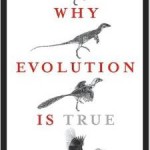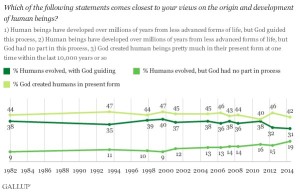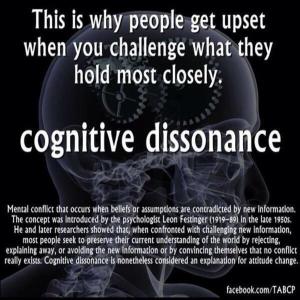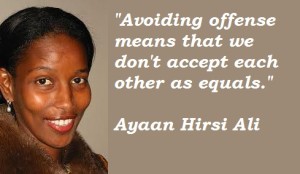 Yesterday (26 March) was Richard Dawkins’s 74th birthday. I’m a big fan of Dawkins – it was while watching one of his documentaries a few years ago that I realized that I was an atheist, and had been at least agnostic since I was a child. The God Delusion was my first foray into atheist literature, and everything Dawkins wrote in that book expressed thoughts I’d already had, but hadn’t said out loud. One of my favourite Dawkins quotes is the one to the right which I posted on Twitter yesterday along with a “Happy Birthday” for the man himself.
Yesterday (26 March) was Richard Dawkins’s 74th birthday. I’m a big fan of Dawkins – it was while watching one of his documentaries a few years ago that I realized that I was an atheist, and had been at least agnostic since I was a child. The God Delusion was my first foray into atheist literature, and everything Dawkins wrote in that book expressed thoughts I’d already had, but hadn’t said out loud. One of my favourite Dawkins quotes is the one to the right which I posted on Twitter yesterday along with a “Happy Birthday” for the man himself.
One of the attacks the religious make on atheists is that not believing in God means we have no sense of wonder. My experience has been quite the opposite. The more I learn and understand about our world and the way it works, the more in awe of it I am. I simply don’t understand how someone can be satisfied with the answer, “God did it”. I think reality is far more amazing and wonderful than the idea that some magic man created our universe. Besides, if it was a god, he didn’t do a very good job as Stephen Fry pointed out so eloquently recently:
 In a post entitled Teaching Evolution in Kentucky – With Accomodationism on his website today, Professor Jerry Coyne wrote about some of the issues encountered teaching evolutionary theory in the United States. While his personal views are well known via his books, articles, website and media appearances, when performing his day job as a University of Chicago professor he refrains from mentioning religion or atheism. There is really no reason religion should come into a class about evolution and besides, the First Amendment of the US Constitution makes Coyne’s stance the legally correct one.
In a post entitled Teaching Evolution in Kentucky – With Accomodationism on his website today, Professor Jerry Coyne wrote about some of the issues encountered teaching evolutionary theory in the United States. While his personal views are well known via his books, articles, website and media appearances, when performing his day job as a University of Chicago professor he refrains from mentioning religion or atheism. There is really no reason religion should come into a class about evolution and besides, the First Amendment of the US Constitution makes Coyne’s stance the legally correct one.
 In the United States though, where only 19% of the population accept the reality that humans evolved with God playing no part in the process, it can be difficult to avoid talking about religion. For a large part of the population, evolutionary theory is a threat to their religious identity.
In the United States though, where only 19% of the population accept the reality that humans evolved with God playing no part in the process, it can be difficult to avoid talking about religion. For a large part of the population, evolutionary theory is a threat to their religious identity.
Coyne’s piece is about an article in Orion magazine written by Professor Jim Krupa of the University of Kentucky called Defending Darwin. (Go to the link to see the beautiful painting by Alexis Rockman if nothing else.) As someone who teaches evolution in a Bible Belt university to students who aren’t science majors, Krupa is frequently confronted by those who do not accept that evolution is a proven theory just as much as the theory of gravity or germ theory. Krupa reports that even those students who did biology in high school, are rarely taught human evolution. It seems the idea is just too controversial. Krupa states that students can accept evolutionary theory and retain their religion beliefs, and discusses how he teaches the idea that the two are not in conflict. As can be seen from the Gallup poll above, that is exactly what 31% of Americans manage to do.
 But is this form of accomodationism really a good way to teach? While acknowledging Krupa’s teaching ability Coyne doesn’t think so, and neither do I. I can accept that this is what many people may choose to do themselves after being taught the theory, but for a teacher to take this stance is wrong in my view.
But is this form of accomodationism really a good way to teach? While acknowledging Krupa’s teaching ability Coyne doesn’t think so, and neither do I. I can accept that this is what many people may choose to do themselves after being taught the theory, but for a teacher to take this stance is wrong in my view.
If a student is having trouble reconciling the reality of evolution with their religious beliefs by all means consult a leader in their religious community, or explore the contradictions in the many ways that are available these days. But a teacher of evolution should stick to the subject. The reality is that religion is completely irrelevant to a course on evolution. The only reason it comes up is that so many people feel entitled to force their religious views on others in any and all environments. They do not have this right, especially in a country that espouses the principles of both freedom of speech and religion.
 I’ve posted this cognitive dissonance graphic before. Krupa wrote of students who walked from his class as soon as he started lecturing about human evolution, including two who yelled that he was lying before storming out. They had been taught that humans were created by a god from their earliest childhood, and were clearly unable to reconcile what they were hearing with what they thought they knew. This much is obvious.
I’ve posted this cognitive dissonance graphic before. Krupa wrote of students who walked from his class as soon as he started lecturing about human evolution, including two who yelled that he was lying before storming out. They had been taught that humans were created by a god from their earliest childhood, and were clearly unable to reconcile what they were hearing with what they thought they knew. This much is obvious.
I’m more interested in their petulant and childish reaction when they are confronted by someone who challenges their worldview, because I find that extremely problematic, and it goes back to the Dawkins quote I posted at the start. It is also, I think, a reflection of the overly protective way many in generations X and Y have been parented. In this example we’re seeing those who have been brought up in an environment where the information they are exposed to has been restricted to that which supports their religious world view. They can’t handle hearing other opinions. (Although, of course, evolution is more than an opinion.)
Another example of this phenomenon is the recent proliferation of Safe Spaces on American college campuses. Multiple Universities now have Safe Space initiatives, all of which seem to be competing for the most attractive logo. The American University in Washington DC even runs regular safe space workshops. While the idea of promoting inclusion and acceptance for all students is a good one, it also promotes the idea that spaces that aren’t denoted “safe” are unsafe.The idea that no-one can say anything that might hurt someone else’s feelings is patently ridiculous in an environment which is supposed to be about challenging ideas. It has created such inanities as the University of California student council banning the display of national flags in their lobby because someone might get upset and that this somehow displays “…freedom of speech is a valued right that ASUCI supports”. To me, this goes against the whole notion of freedom of speech and expression.
Jerry Coyne wrote about the safer space initiative at Columbia University in a piece entitled ‘The anti-free speech police ride again‘. At Columbia, Safer Space flyers have been distributed to all students encouraging them to put them in their windows. Again, while the idea of making students of any and all descriptions feeling equally valued is a good one, what these flyers really do is restrict and suppress freedom of speech. In order to stop racism or sexism or anti-Semitism or homophobia or any other prejudice the idea should be to come up with a better argument than those who hold such ideas. Homophobia isn’t reducing because we stopped talking about gay people, it’s reducing because we started, and we demonstrated that the prejudices people held were nothing more that ignorance and baseless fears.
 For a while now, universities have been rescinding speaking invitations when students protest that some may be offended by the speaker too. One of the best known is that of Brandeis University who were to present Ayaan Hirsi Ali with an honorary degree last year, but the accolade was withdrawn when multiple student groups, on the initiative of the Muslim Students Association, protested. According to the New York Times a spokesperson said “We cannot overlook that certain of her past statements are inconsistent with Brandeis University’s core values”. Those past statements were her objections to some of the practices of Islam, which really should not have been a surprise if they knew her well enough to offer her an honorary degree.
For a while now, universities have been rescinding speaking invitations when students protest that some may be offended by the speaker too. One of the best known is that of Brandeis University who were to present Ayaan Hirsi Ali with an honorary degree last year, but the accolade was withdrawn when multiple student groups, on the initiative of the Muslim Students Association, protested. According to the New York Times a spokesperson said “We cannot overlook that certain of her past statements are inconsistent with Brandeis University’s core values”. Those past statements were her objections to some of the practices of Islam, which really should not have been a surprise if they knew her well enough to offer her an honorary degree.
Freedom of speech and expression are the most important rights we have. There are many countries where people don’t yet have those rights, especially if they are the member of a minority, women, children, or poor. Students of an American University are amongst the most privileged people on the planet, yet many of them do not seem to appreciate how lucky they are. Instead of reveling in a rich intellectual environment and taking advantage of it to expand their mental frontiers, they are trying to continue the protections of their childhood. It’s time to grow guys. Make the most of this opportunity to explore ideas – don’t protect yourself from them and especially don’t try to stop others from doing it.



Anywhere you go the world is full of prejudice against minorities. Christians in Muslim lands, Muslims in Christian lands. Homosexuals almost everywhere and dark skinned people in many places. Ignorance, bullying, and discrimination are ubiquitous. The purpose of safe spaces is to assure people who face such hatred daily, that this is a space where they won’t be attacked for their religion, race, sexual orientation, gender, ethnicity, or physical disability. It is not a space that continue the protections of childhood. It is a space that rejects the prejudice and bigotry that are all too common in the childhood of many people and promises to treat humans as humans, not as minorities or “the other”.
Those who think that denouncing minority cultures or religions or sexual orientations are promoting the cause of free speech rather than perpetuating prejudice, hatred and discrimination have blinded themselves to the realities of the world. Hate speech has always been free for the majorities who demonize those who are different than themselves. It takes little courage to denounce Muslims or homosexuals in America, Just like it takes little courage to denounce Christians or atheists or homosexuals in Muslim lands. The courage comes from those who stand up against prevailing prejudice and hatred in their own societies and create safe spaces for the downtrodden and abused. Gratuitously offending marginalized people should not be confused with defending free expression.
I feel that once again, you have deliberately missed the point.
http://www.alternet.org/media/anti-islam-author-ayaan-hirsi-alis-latest-deception
Hi Paxton. I kind of think you’ve made my point – it is by talking and freedom of speech that these things are discovered. When the Russian government, for example, tells lies or makes misleading statements in the Russian media, what they say is accepted by most because they cannot be challenged. We need to keep talking to find the truth.
Hirsi Ali is not perfect, but there is still much about her that I admire. Refusing her permission to speak is not the way to counteract those of her opinions that some may not agree with. It is by allowing her to speak, then coming up with more reliable information, or better analysis, or just a better argument – if you can.
Hi Heather. The biggest lies are those fictions or half-truths, for which there is an implicit agreement not to challenge them. There were no laws in America that prevented people from speaking out against the genocide of the indigenous population. This continued unabated from the earliest colonies into the twentieth century, yet was not only not part of the national narrative, but was concealed by a counternarrative that portrayed the pioneers as heroes in opposing the heathen Indians. It’s not that there were laws against stating the truth, and of course a few did. But their voices were drowned out by the national myth of “manifest destiny” and the march of “freedom”.
A similar thing is happening with the Bush invasion of Iraq. Many now admit it was a mistake, but few can recognize that it was an act of terrorism, unleashing advanced weapons against a defenseless people.
Talking alone will not bring us closer to truth if the talking we protect is to malign the groups we have wronged. The west has an extensive history of undermining Islamic societies, overthrowing governments we did not like, supporting ruthless dictators who would do our bidding. Yet the free speech we seem anxious to protect is that of detractors of Islam, thereby implicitly justifying our terrorism. Is allowing Muslim leaders to recruit for ISIS different from allowing Muslim antagonists to promote an attack on Iraq or Iran?
When free speech is simply a vehicle to vilify the underdog, whether of a different race, ethnicity, religion or sexual orientation, it works not in the cause of freedom but in the cause of oppression. Brandeis did not deny Ayaan Hirsi Ali her right of free speech, it simply denied her a particular platform. In doing so Brandeis used its own right of free speech to contradict the message of Ali. Isn’t that just as valid as Ali’s right to speak? If a homosexual fears the response to revealing his/her orientation (and there is plenty of justification for that fear), doesn’t a safe space with people who have committed to not attack her/him, promote, rather than restrict free speech. Just because the law guarantees free speech doesn’t mean people will not suffer for saying unpopular things.
Why are those championing free speech not pushing the limits of examining our (the west’s) own crimes, rather then piling on minority groups who we have already wronged? Why get incensed over the murder of a dozen cartoonists, and ignore the murder of 2000 Palestinians or 200,000 Iraqis. It’s our inability to apply the same standards to ourselves that we apply to others, that is the real barrier to free speech. When “free speech” is used to denigrate homosexuals or Muslims or blacks or Maori or other minorities it is not contributing to the quest for truth and understanding, but is a tool of ignorance and distortion.
So we keep talking. And we continue to expose the murder of 2000 Palestinians, and the appalling conditions many Palestinians have to live in where many can’t even get clean water. And we also expose the damage Hamas is doing to it’s own people by diverting what resources they do get to terrorist activities that give many the excuse they need to keep Palestine downtrodden.
Yes, there are many environments where, for example, an LGBT person would not want to reveal that fact, and all of society should be safe for them to do that, which I said in my article, but shutting down speech isn’t the way to change things. The bigots should be confronted. Some, of course, don’t feel able to do that, so those of us that can need to keep speaking up so that the force of our argument persuades more and more until it is the bigots who are the minority. Prejudice is wrong, and the arguments for it cannot stand the light of day.
If Brandeis hadn’t offered Hirsi Al in the first place, I wouldn’t have a problem. My problem comes when people are offered a platform, then it is withdrawn because because someone claims they will be offended. It’s just happened again, this time to Maryam Namazie in Ireland: http://freethoughtblogs.com/maryamnamazie/2015/03/23/tcd-2/
The idea of free speech is that I can talk about what I like and you can talk about what you like. If you think a particular issue isn’t being addressed sufficiently, you can go and talk or write about it yourself to bring it to the attention of others. As I’ve said before, as an American you have no limits on what you say, you personally have the ability to write, and it’s possible to set up a blog for free and advertise yourself freely via social media. If your argument is good, others will be persuaded and help share the message.
Yes, there are plenty who abuse the privilege of free speech, but that isn’t a reason to stop it. We need to counter their arguments. There are a million injustices in this world to talk about. I don’t need to justify to anyone which ones I choose to address at a particular time. I never ignored what happened in the Iraq War – I went on and on about it at the time. There are other things I’m looking into in Africa, the Middle East, Asia and Europe at the moment. I don’t know which ones will turn into articles, but it’s my voice and my choice. It’s your choice what you use your voice for.
I love free speech Heather, and I use it whenever I can. I agree with everything you say. I cherish my freedoms. But I am a realist and I recognize that there are discrepancies of power in the world and the powerful tend to exploit those without power, and to frame the discussion to their point of view. The importance of free speech is to give voice to the powerless. But when it is used to further denigrate the powerless, as in the whole blackface/minstrel tradition in the US after the civil war, or in Birth of a Nation, the racist movie classic, we rightly condemn it as hate speech. We may choose to make it legal. But we cannot admire it.
Hi Heather,
You always allow critical posts on your blog, so at least you practise what you preach when it comes to freedom of speech.
However, when I said Jerry Coyne hasn’t always allowed critical comments on his blog, you said it’s his blog and so his choice – that to me seemed apologism just because you admire his writing.
Of course, there are always two sides to a story, and if Jerry wants to give his explanation as to why he stopped a perfectly reasonable atheist blogger from posting on the comments section on his blog, that would be great.
I’ll be posting on Jerry’s latest ridiculously one-sided article on Hirsi a bit later today – let’s see if he lets the comments go through.
Thanks.
Hi AU. I don’t think you can really correlate what someone allows on their own website with general freedom of speech. It would be like me expecting to be able to turn up to Friday prayers at a mosque and lecture the worshipers.
Everyday a heap of spam gets caught by an app before it gets on my website. I don’t allow those who are trying to sell all sorts of things access to my site. I also expect people to conduct themselves properly, and it’s my decision what that means. Like me, Jerry considers his website an extension of his home. He doesn’t have to put up with anyone he doesn’t want to – it’s got nothing to do with what I think of him personally. I hope that if a similar situation arose with someone I didn’t like, my attitude would be the same. Feel free to call me out if I’m not consistent. 🙂
Hi Heather,
I completely disagree with your analogy of a mosque and Friday prayers. Friday prayers aren’t an event open to the public for a debate, they are an event only for Muslims to come and pray. Therefore, of course you or anyone else for that matter shouldn’t have the right to go and start debating there.
However, if the members of the mosque have set up a stall in the street and are handing out leaflets criticising atheists, of course you now have a right to go and debate them. They are in a public space, and they are propagating a view you do not agree with. Therefore, you have a right to counter that view. If they do not allow you to counter their arguments in public, then they do not believe in open and honest discussion.
It is wrong to say your website, or Jerry’s website, is an extension of your/his home – it isn’t. Once you start using your website to promote a certain view and to attack a certain group, it isn’t your home anymore, it becomes more like a public hall, and if in a public hall you do not allow opposing views to be heard, then you’re not really someone who is interested in an honest and open debate. Ok, sure, it might be wrong of me to say “you do not believe in freedom of speech”, but you certainly do not believe in an open and honest debate. The question then is, why? Surely if you are so certain that what you are saying is correct, you will then allow opposing views, and then, to borrow a word Jerry uses, “destroy” them. If you want to silence opposing views, then it is quite likely that you are actually afraid that what you are saying isn’t the real deal, and that people, after hearing opposing views, will stop following the view you are propagating. Hmmm, not letting people speak out for fear they might stop following you, where have we heard that before, oh yeah, religious fundamentalism!
As for “he might not have read the posts”, what if I was to tell you I also posted a pro-Jerry message under a different name, and that went through? Wouldn’t it be strange that all the messages that exposed what was wrong in his article didn’t go through, and the one that was pro his view did go through.
Unfortunately, Jerry doesn’t have a contact email address, apart from the one for media inquiries, and as I am not on Twitter, I have no way to contact him, but he is more than welcome to give his reasoning as to why he doesn’t let messages through that show the errors in his articles.
Thank you.
Hi AU. Sorry it took so long to get your comment up – I forgot to check my website this morning.
A website address is paid for privately, so it is a private space. If his website was being paid for by his employer, for example, as an employee of a public university he wouldn’t be able to write about about religion. Whether or not any of us agree with who he allows on his website, it is his still his choice.
I won’t give you Jerry’s e-mail address here, but if you go to “Research Interests” on the top right of any website page, there is an e-mail address there that will reach him directly. Again, he may choose not to respond, but you will at least know you’ve contacted him. If you tried to contact him on Twitter, that wouldn’t have worked anyway, as he rarely if ever reads messages sent to him via Twitter.
I agree that Jerry Coyne’s barring AU and me (along with many others) from commenting on his blog does not infringe our freedom of speech, any more than Brandeis uninviting Hirsi Ali interferes with her freedom of speech. But it does raise questions about Coyne’s claim to be rational, evidence based and even-handed in his rejection of religious privilege.
I know why Coyne blocked me. It was because I disagreed with his whitewashing of Israel for the slaughter of 2000 Palestinians last summer. It is clear that he is not willing to subject his own heritage, Judaism, to the same critical standards he holds for Islam.
But I think that Coyne’s bigger blind spot is that he seems to think that by rejecting religious claims he has overcome bias, prejudice, and irrationality. He thinks his animus against Islam is based purely on rational considerations. He abstracts religious motives from motives of power, wealth and nationalism as particularly evil. He attributes all Muslim atrocities to their religion, and will not hear of the role of western imperialism in the radicalization of Islam. He cannot see the parallels between US attacks on helpless Iraqis and Muslim acts of terrorism. He’s so anxious to attribute all the evil in the world to religion, that he ignores or is unaware of cultural and historical context.
It takes courage to speak truth to power. This is the free speech we protect and cherish. If Coyne were writing in Pakistan or in 15th century Europe, he would be a brave man indeed. But it takes no courage to demonize minorities. There has never been a shortage of Free speech that is invoked by privileged majorities to satirize and demean blacks, Jews, indigenous peoples, Muslims and other disadvantaged groups. To use free speech to denounce and stir up animosity against helpless people who we have already harmed and against whom we are contemplating further harm (e.g. military attacks against Iran) is not an act of courage, but joining in with the bullies. The irony is that Coyne is now allying himself with right wing Christian evangelicals, who he otherwise disparages, against Islam. Just as his mentor Hitchins helped prepare the ground for US/UK terrorism against the Iraqi people, Coyne is abetting those, such as Netanyahu and the US neo-cons who are agitating for further western military slaughter of Muslims.
AU, please let me know where I can read your piece on Hirsi Ali. Heather, thanks again for your indulgence in allowing contrary opinions.
Hi Paxton,
I stand corrected – it doesn’t strictly speaking infringe our freedom of speech, but it does show that the author isn’t really interested in an honest and open debate.
I made numerous posts on the comments board so there is no one “piece” that I wrote, but none of them were allowed to go through. Maybe the first post I made put him off (“So Jerry Coyne writes he hates being in bed with conservatives, yet the basis of his article is a one-sided, dishonest article written by a pro-Israel neoconservative, in a neoconservative magazine!”) and that’s why he didn’t let any other go through!
Thank you.
Hi AU, yes, I think that opening line (“So Jerry Coyne writes he hates being in bed with conservatives, yet the basis of his article is a one-sided, dishonest article written by a pro-Israel neoconservative, in a neoconservative magazine!”) probably sunk your chances of appearing in WEIT comments. They (the comments)are usually not very interesting for that reason. A bunch of “yes people” sharing inside jokes. I agree that Coyne is not interested in an honest and open debate on his web page and screens out opposing views. In a way that is good, because it eliminates all the creationist drivel he naturally attracts. But he really can’t handle criticism. Anyway, Heather is more tolerant, so why not repost your comments here.
Yes, this website is much more open to an honest and open debate than Coyne’s, but I guess there is no point in posting my criticisms of Coyne’s article here as Heather is an independent blogger who did not endorse Coyne’s particular article in it’s entirety.
Hi Paxton. I’m not going to get into the arguments because I’ve made them before and you know my opinion. I just wanted to put on record in this particular thread that I disagree with much of your characterization of Jerry’s position. Also, while my position is not the same as Jerry’s, I disagree with your position too.
My position, Heather, is that free speech and atheism should not be used as justifications for singling out minority groups for demeaning characterizations. Do you disagree with that?
I agree with that completely. You put more weight on some causal factors than I do, and I put more weight on others.
According to the writing, Adam and Eve were the first humans created by God, who lived approximately 6,000 years ago. According to the science, humans existed a long time before. The two lines of thought can be easily united, thanks to the omnipotence of God, who in the beginning created humans in a reality where there was no concept of “evil”. Metaphorically speaking, Adam and Eve were expelled from this heavenly reality, find himself in another reality, namely in today’s reality that we all know, where there is the concept of evil, as well as that of the well; not necessarily a reality where they were the first humans, but the first who experienced firsthand the life God had reserved for them (so they were the first humans in the “perfect” reality). From here it is clear that the story of Adam and Eve does not upset in the least bit the evolutionary linearity. In practice, they were the first men of God; whereas prehistoric man lived before Adam and Eve was a man, but it could be considered as an animal evolved from apes or created by something else, which had two arms and two legs, and that may have hybridated with the descendants of Adam And Eve after they were “moved away” from the “perfect reality”. God has endowed man about the concept of “infinity” and “eternity”, as well as other questions can not be explained through the use of the scientific method, thus making humans free to believe in God or not, in a reality for us tricky and necessary for the construction and continuation of his project.